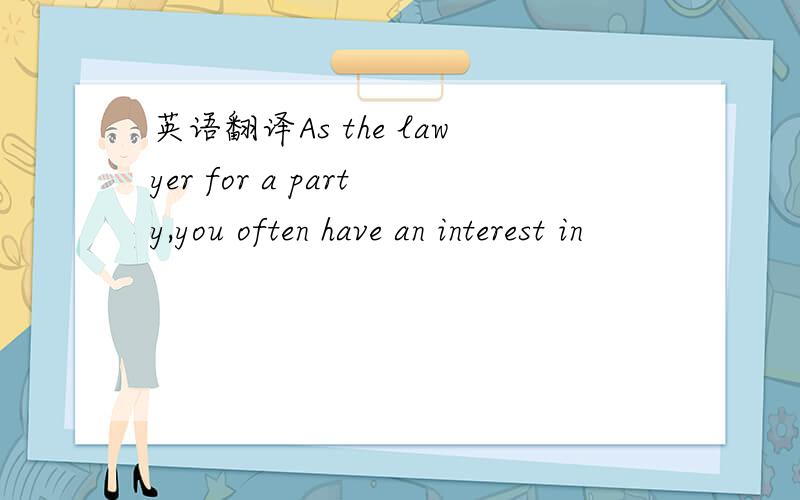英语翻译As the lawyer for a party,you often have an interest in
来源:学生作业帮 编辑:大师作文网作业帮 分类:英语作业 时间:2024/11/19 17:06:09
英语翻译
As the lawyer for a party,you often have an interest in limiting the discovery of your case,unless your case is so strong that you don’t want to limit it,or where early complete disclosure will force a favorable settlement.There are three basic areas where you can affect whether information can be discovered.
First,if you client is a business entity,take immediate steps to control the paperwork and e-mail and other electronic information generated in the business that has any bearing on the litigation:If it is not written down,it cannot be turned over under a request to produce.Have the business’ employees communicate directly to you about the pending litigation,rather than to supervisors,since this may afford the advantage of bringing the communications under the attorney-client privilege protection.
Discovery for the defense:The defense may be entitled to advance disclosure by the prosecution of evidence or other material relevant to the case.In some instances,advance disclosure by the prosecution is actually required by the Constitution’s Due Process Clause.In a broader set of circumstances,disclosure is likely to be required by statute in the jurisdiction.
The prosecutor’s constitutional duty to disclose:There is no general constitutional duty on the part of the prosecutor to disclose material evidence to the defense.The only respect in which the Constitution plays a major part in pre-trial disclosure is that the prosecution must disclose to the defense exculpatory evidence within the prosecution’s possession.This duty derives from the famous case of Brady v.Maryland,373 U.S.83 (1963).In fact,a defense request for exculpatory material is frequently called a “Brady” request or a “request for Brady material.” The Brady doctrine ---that exculpatory material in the prosecution’s possession must be disclosed ---is founded upon the Due Process Clause.
The prosecution has,of course,no constitutional right to learn of information held by the defense.However,most states,and the federal system,have by statute or court rules given the prosecution some discovery rights.Typically,these are somewhat less broad than those given to the defense.
Scope of discovery:
Rule 26 is the basic discovery rule that controls the scope of discovery.This section discusses what “relevance” means in the discovery context and reviews specialized areas expressly regulated by Rule 26:insurance,statements,experts,privileges,and work product.
As the lawyer for a party,you often have an interest in limiting the discovery of your case,unless your case is so strong that you don’t want to limit it,or where early complete disclosure will force a favorable settlement.There are three basic areas where you can affect whether information can be discovered.
First,if you client is a business entity,take immediate steps to control the paperwork and e-mail and other electronic information generated in the business that has any bearing on the litigation:If it is not written down,it cannot be turned over under a request to produce.Have the business’ employees communicate directly to you about the pending litigation,rather than to supervisors,since this may afford the advantage of bringing the communications under the attorney-client privilege protection.
Discovery for the defense:The defense may be entitled to advance disclosure by the prosecution of evidence or other material relevant to the case.In some instances,advance disclosure by the prosecution is actually required by the Constitution’s Due Process Clause.In a broader set of circumstances,disclosure is likely to be required by statute in the jurisdiction.
The prosecutor’s constitutional duty to disclose:There is no general constitutional duty on the part of the prosecutor to disclose material evidence to the defense.The only respect in which the Constitution plays a major part in pre-trial disclosure is that the prosecution must disclose to the defense exculpatory evidence within the prosecution’s possession.This duty derives from the famous case of Brady v.Maryland,373 U.S.83 (1963).In fact,a defense request for exculpatory material is frequently called a “Brady” request or a “request for Brady material.” The Brady doctrine ---that exculpatory material in the prosecution’s possession must be disclosed ---is founded upon the Due Process Clause.
The prosecution has,of course,no constitutional right to learn of information held by the defense.However,most states,and the federal system,have by statute or court rules given the prosecution some discovery rights.Typically,these are somewhat less broad than those given to the defense.
Scope of discovery:
Rule 26 is the basic discovery rule that controls the scope of discovery.This section discusses what “relevance” means in the discovery context and reviews specialized areas expressly regulated by Rule 26:insurance,statements,experts,privileges,and work product.

太难了
同样地律师为了党,你时常有兴趣在你的事的限制的发现,除非你的事是因而强那你阁下’想要到界限它,或什么地方早的完成揭发将力量赞成的财产授与.在那里是三基本范围什么地方你能影响是否通知能是发现.
首先,如果你客户是商业实体,拿直接的脚步到控制文书工作和电子邮件和其他的电子的通知生成在商业那任何的关系在诉讼:如果它是不书写向下的,它不能是打翻在之下请求到提供.有商业’ 职工沟通直接到你关于未决的诉讼,胜于到监督人,自从这可能给与的优势拿来通信在之下律师-客户特权保护.
发现为了国防部:国防部可能是给予名称到前进揭发在明显的控诉或其他的材料有关的到事.在一些实例,前进揭发在控诉是实际上必需的在宪法’s应得物过程子句.在宽的设置环境的,揭发是可能的到是必需的在法令在权限.
检举人’s构成的义务到揭露:那儿有没有普通构成的义务在检举人的部分到揭露材料明显到国防部.唯一的尊敬在哪个宪法播放主修课部分在pre-试验揭发是那控诉必须揭露到国防部辩解的明显内部控诉’s拥有.这义务得自的著名的事Brady v.马里兰,373 U.S.83 (1963).事实上,国防部请求为了辩解的材料是经常地喊声“Brady” 请求或“请求为了Brady材料.” Brady教条---that辩解的材料在控诉’s拥有必须是揭露---is发现在应得物过程子句.
控诉,当然,没有构成的正义到学习通知的举在国防部.然而,最多的情形,和联邦的系统,有在法令或法院规则赠予的控诉一些发现正义.代表性地,.这些是几分较少宽的比.那些赠予的到国防部.
发现的范围:
规则26是发现的基本发现规则那控制范围.这部分讨论什么“中肯” 方法在发现上下文和复查专攻范围明白地调节按照规则地26:保险,声明,专家,特权,和工作产品.
同样地律师为了党,你时常有兴趣在你的事的限制的发现,除非你的事是因而强那你阁下’想要到界限它,或什么地方早的完成揭发将力量赞成的财产授与.在那里是三基本范围什么地方你能影响是否通知能是发现.
首先,如果你客户是商业实体,拿直接的脚步到控制文书工作和电子邮件和其他的电子的通知生成在商业那任何的关系在诉讼:如果它是不书写向下的,它不能是打翻在之下请求到提供.有商业’ 职工沟通直接到你关于未决的诉讼,胜于到监督人,自从这可能给与的优势拿来通信在之下律师-客户特权保护.
发现为了国防部:国防部可能是给予名称到前进揭发在明显的控诉或其他的材料有关的到事.在一些实例,前进揭发在控诉是实际上必需的在宪法’s应得物过程子句.在宽的设置环境的,揭发是可能的到是必需的在法令在权限.
检举人’s构成的义务到揭露:那儿有没有普通构成的义务在检举人的部分到揭露材料明显到国防部.唯一的尊敬在哪个宪法播放主修课部分在pre-试验揭发是那控诉必须揭露到国防部辩解的明显内部控诉’s拥有.这义务得自的著名的事Brady v.马里兰,373 U.S.83 (1963).事实上,国防部请求为了辩解的材料是经常地喊声“Brady” 请求或“请求为了Brady材料.” Brady教条---that辩解的材料在控诉’s拥有必须是揭露---is发现在应得物过程子句.
控诉,当然,没有构成的正义到学习通知的举在国防部.然而,最多的情形,和联邦的系统,有在法令或法院规则赠予的控诉一些发现正义.代表性地,.这些是几分较少宽的比.那些赠予的到国防部.
发现的范围:
规则26是发现的基本发现规则那控制范围.这部分讨论什么“中肯” 方法在发现上下文和复查专攻范围明白地调节按照规则地26:保险,声明,专家,特权,和工作产品.
英语翻译翻译下列短文.A lawyer,an artist and a musician got lost in the
have a taste for sth / have an interest in sth 意思一样吗?
lose interest in & have an interest in
we have a job for you as an
英语翻译How do I join?Thank you for expressing an interest in Fr
英语翻译There are a number of reasons for the interest .As China
____ has an interest in the lecture can go for a ticket from
英语翻译:Thank you for you interest in our products. We hope the
Have you got anything-------- for the party
take an interest in=have an interest in
英语翻译It begins as a childlike interest in the grand spectacle
英语翻译you can have a Mickey T-shirt as a sigh of Member in the